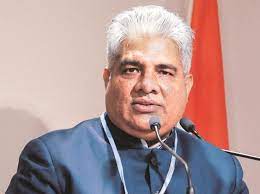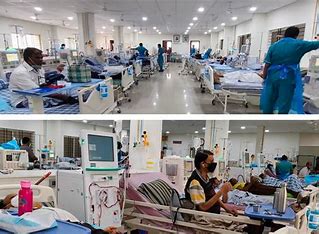
India has seen a significant rise in job opportunities over the past nine years, with approximately 1.25 crore new jobs created since 2014, according to Union Labour and Employment Minister Bhupender Yadav.
Yadav delivered these remarks while addressing a press conference on the performance of the labour ministry over the last nine years. He cited numerous institution-based labour surveys conducted by his ministry to demonstrate the employment growth between 2014 and 2022.
Yadav substantiated his claim by citing data from the Employees Provident Fund Organisation (EPFO), indicating that the number of pensioners under the Employees’ Pension Scheme 1995 rose from 51 lakh in 2014-15 to 72 lakh in 2021-22. He pointed out that despite approximately 22 lakh people retiring, registrations istrations under the social security scheme managed by the EPFO have increased.
Further data from the EPFO showed that the total number of registered subscribers climbed from 15.84 crore in 2014-15 to 27.73 crore in 2021-22. Moreover, the latest payroll data from the EPFO revealed that in April 2023 alone, there were 17.20 lakh net new member additions.
Yadav outlined that new member enrolment with the EPFO was 1.38 crore in 2022-23, a growth from 1.22 crore in 2021-22, and 77.08 lakh in 2020-21. The data also showed that 78.58 lakh members were added in 2019-20 (pre-Covid) and 61.12 lakh in 2018-19.
The Union Minister highlighted the Modi government’s focus on ‘Sewa, Sushasan, Kalyaan’ (Service, Good-Governance, Welfare). He emphasised the government’s commitment to the welfare of both organised and unorganised workers, noting that organised workers account for just 10% of the total workforce, with 90% falling into the informal sector. He addressed ongoing discussions about obtaining reliable data on the informal sector and efforts to provide benefits to these workers under welfare schemes, tracing back to the Congress regime.
Discussing the JAM (Jandhan Aadhaar Mobile) initiative, Yadav revealed that about 30 crore workers from 400 different occupations are now enrolled under the e-Sharam portal (a national database for informal workers). Initially, the portal had 120 categories of occupations for enrollment, which subsequently expanded to 400. The e-Sharam portal was launched on August 26, 2021, with a goal to create a national database for unorganised workers.
The minister has instructed his officers to identify separate occupations for rag pickers similar to those in the coffee, rubber, tea, and lichi plantations sectors. The classification of occupations, he explained, aids in formulating effective policies to boost employment generation within specific sectors.
Yadav also highlighted the ministry’s labour surveys initiative and mentioned the forthcoming release of area-based survey results to support the creation of evidence-based policies. Turning to the National Career Service (NCS) portal, Yadav revealed that it helped mobilise 1.39 crore job vacancies over the past nine years. The portal currently hosts 3.20 crore registered job seekers, 11.25 lakh active employers, and 6.42 lakh active job openings.
Lastly, Yadav stated that the number of beds in the Employees State Insurance Corporation (ESIC) hospitals would soon be increased by 10,120, which currently stands at 20,231. This enhancement forms part of the broader effort to improve welfare services for the Indian workforce.















